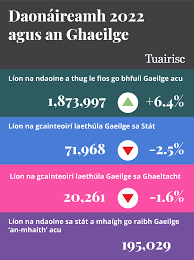2022 Census!
The figures regarding the use of the language were recently published, based on the 2022 Census. There was a 2.55% drop in the number of people speaking the language every day outside the education system, from 73,803 in 2016 to 71,968 in 2022. There was a 2.18% drop in the number of people speaking the language every week, from 111,473 in 2016 to 109,099 in 2022. I see from the government only lip service instead of a comprehensive plan to achieve an increase as opposed to a decrease of Irish speakers. These statistics are eye-opening for us, without a doubt.
I have a few words!!
The number of people who speak Irish rose by 0.6% of the population from 39.8% (1,761,420) in 2016 to 40.4% (1,873,997) in 2022. But of those people, only 10% said that they speak Irish very well , and another third saying that they speak Irish well. The rest (55%) who speak Irish said they are not able to speak it well.
In the Gaeltacht?
The number of people in the Gaeltacht who speak Irish increased, from 63,664 in 2016 to 65,156 in 2022 (an increase of 2.3%). But the number of people in the Gaeltacht who speak Irish every day has decreased from 20,586 in 2016 to 20,261 in 2022 (a 1.6% drop).
Analysis
What is going on at all? On the one hand, things seem to be improving. But on the other hand, the figures say that things are getting worse. Which is correct?
In my opinion, one need not be right and the other wrong. Analysis is necessary to make sense of these figures.
I think that the number of people who speak Irish is increasing because the revival of the language is taking place in the country and people want to improve and practice their Irish if possible. But for the most part people cannot speak Irish in the normal activities of life, because there is not enough infrastructure operating in Irish available to them. And that is the basic reason that there is a decrease in the number of speakers of Irish. Therefore, it is clear that the government's policies regarding the Irish language are not working well, despite the will of the public. What a pity that is!
Recommendations
I was at a loss as to what to do, when I received a 'WhatsApp' message from my loyal friend, Micheál Ó Máirtín. It was a sound bite from the program 'An Saol Ó Deas', with Helen Ní Shé interviewing Irial Mac Murchú. Although the number of speakers of the Gaeltacht decreased overall, the number of speakers of increased in the County Kerry and County Waterford Gaeltachts. Irial is the CEO and director of the television production company, Nemoton, and has a particular insight into the issue of Irish spoken in Gaeltacht na n'Déise in Waterford. Here is a summary of a few points he was discussing. The Gaeltacht na n'Déise was almost on its deathbed in the seventies, said Irial, when a kind of revival came. According to Irial, the cornerstone of that revival was the San Nicolás secondary school. The school was established in the fifties and in the seventies the number of pupils grew significantly. A certain generation, even though they themselves were raised in English, decided to raise their children in Irish, and there was still enough Irish in the environment that it worked out well. After a while, the stain of poverty was no longer on the language, and gradually a new generation could be seen, including teachers, lawyers, nurses and the like, who were brought up with Irish. The support of the local organizations helped with these efforts and especially the Gaelic Athletic Association (GAA), because they made Irish classes available to people and did their business through Irish in the Gaeltacht. Therefore, the GAA fostered a natural environment for people to speak Irish. Gradually there was a comfortable environment for people to be able to do everything through Irish.
Conclusion
We do not need to rely on the government to revive our language. We can do it ourselves! We have already had great success with Irish primary schools, and now it is time for us to establish secondary schools wherever we can. Then, we have to put public pressure on the local bodies to encourage them to be able to use Irish as well as English. We will be able to recreate the success of the Gaeltacht na n'Déise in other places like that, by collaborating together!






